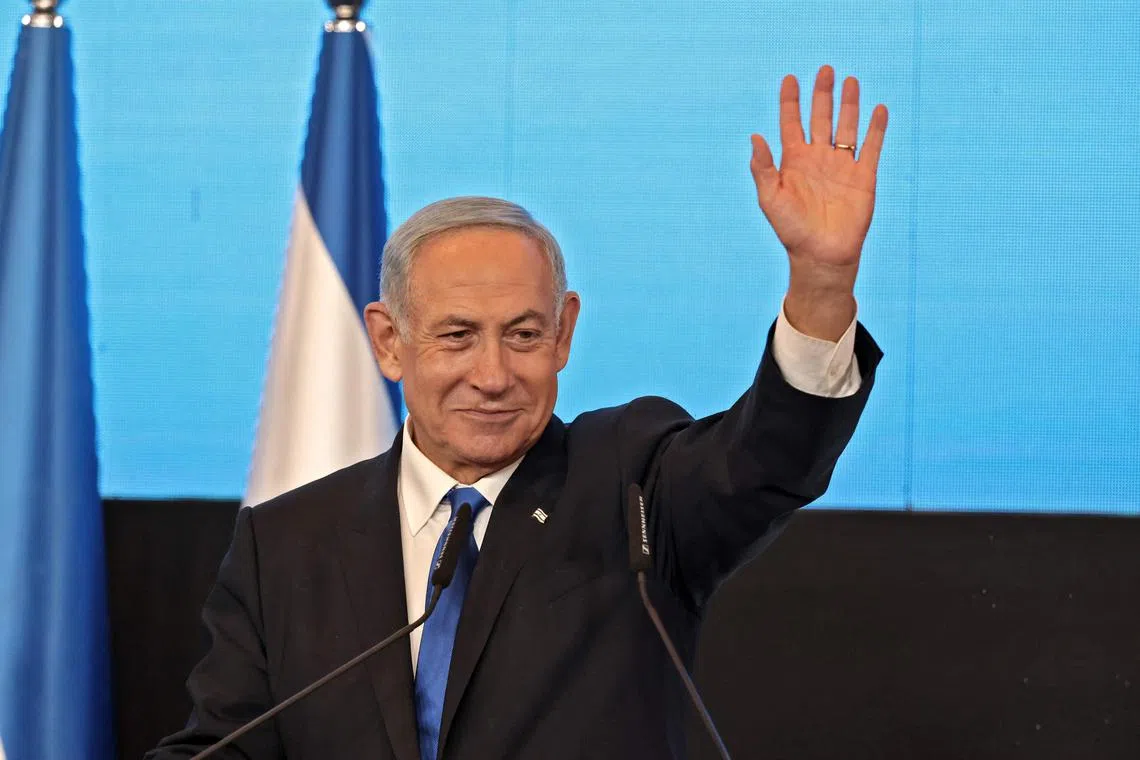A rush of far-right initiatives by Israel’s new government raises concerns
Sign up now: Get ST's newsletters delivered to your inbox

The emerging coalition under PM-designate Benjamin Netanyahu will be the most hard-right and religious administration in Israel’s history.
PHOTO: AFP
Follow topic:
JERUSALEM - As Israel’s prime minister designate Benjamin Netanyahu prepares to swear in his new hard-line government and return to office, his deals to cement the support of far-right coalition partners are raising widespread concerns about the country’s future as a liberal democracy.
The emerging coalition
Netanyahu, Israel’s longest serving prime minister, who was ousted 18 months ago, is on trial for corruption
That dependency, critics say, has weakened him in the coalition negotiations, forcing him to go along with at least some of the demands for far-reaching changes that would limit the powers of the judiciary and curb the independence of the police.
Netanyahu’s hard-line allies need him just as much as he needs them; they, too, have no alternative path to power. But their fundamental lack of trust in Netanyahu, who has a record of breaking promises to coalition partners, led them to insist on a rush of legislation to anchor their new roles and authorities in law, with potentially damaging consequences for the democratic system.
“What we see in the legislation preceding the formation of the government is a change in the rules of the game of Israeli democracy,” said Dr Gayil Talshir, a political scientist at the Hebrew University of Jerusalem.
The outgoing prime minister, Mr Yair Lapid, a centrist, described the incoming government Thursday as “dangerous, extremist, irresponsible.”
“It will end badly,” he said, calling it “a clearance sale of Israel’s future.”
The legislative rush and drafts of coalition agreements include proposals that would allow Parliament to override Supreme Court decisions and would give more weight to politicians in the selection of judges.
Legal amendments would greatly expand the powers of the incoming minister of national security, Mr Itamar Ben-Gvir,
He was convicted in the past
Another amendment will allow Mr Bezalel Smotrich, the leader of the Religious Zionism party,
A third change will allow Aryeh Deri, the leader of the ultra-Orthodox Shas party, to serve as a minister despite a recent conviction and a suspended prison sentence for tax fraud. That amendment, analysts say, could end up applying to Netanyahu should he ultimately be convicted or reach a plea deal including a suspended sentence.
Netanyahu denies all wrongdoing and says the cases against him will collapse in court.
Still, experts say, the proposed changes outlined in the coalition agreements are still in flux.
“Constitutional political changes are being carried out in record speed, even before the government has been established,” said Mr Yohanan Plesner, president of the Israel Democracy Institute, a non-partisan research centre. “This demonstrates the fragility of our democracy.”
But Mr Plesner emphasised that such practices were not unprecedented in Israel and that there were still many possible outcomes.
“There is a discrepancy,” he said, “between the ideas and initiatives and declarations of politicians before elections, and what is actually happening in the negotiating room and being manifested in coalition agreements and government policy.”
The most immediate concerns revolve around the law expanding the powers of Mr Ben-Gvir, the national security minister. It has passed its first reading in Parliament but is still pending final approval.
In the past, the minister overseeing the police would set policy priorities in consultation with the commissioner of police, but would not interfere in operational matters or have any influence over investigations.
The proposed legislation subordinates the police to the minister’s authority, leading legal officials and experts to fear a politicisation of the force. And it grants the minister the right to set priorities and time frames for investigations in a departure from past practices.
“The Israel Police will be run under a threatening and belligerent man who lacks responsibility and experience, who wishes to turn it into a political agency,” and to turn the police commissioner into a “puppet,” the outgoing minister of public security, Mr Omer Bar-Lev, told Parliament this week.
Mr Ben-Gvir argues that the police should be subordinate to a minister’s policy in the same way that the military carries out the government’s policy. But critics say that unlike the military, which fights Israel’s enemies, the mission of the police is to deal with Israeli citizens – including corrupt politicians.
Also of concern are the proposals to change the way the judiciary operates.
If implemented, they will dramatically curb the powers of the Supreme Court, which has long been seen by liberal Israelis and analysts as one of the country’s most important institutions safeguarding against the erosion of liberal democratic values.
Because Israel has only one house of Parliament and no formal Constitution, the judiciary plays a critical role in protecting minority rights and offsetting rule by the parliamentary majority. NYTIMES

